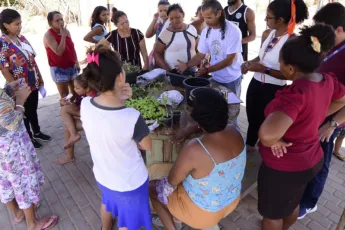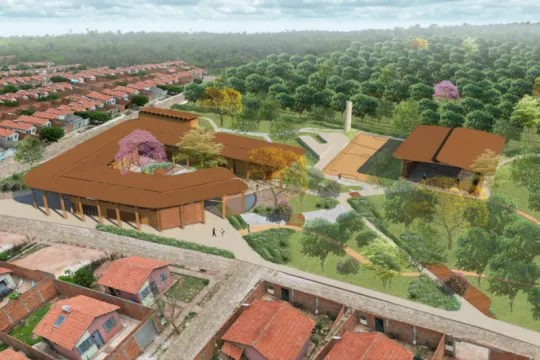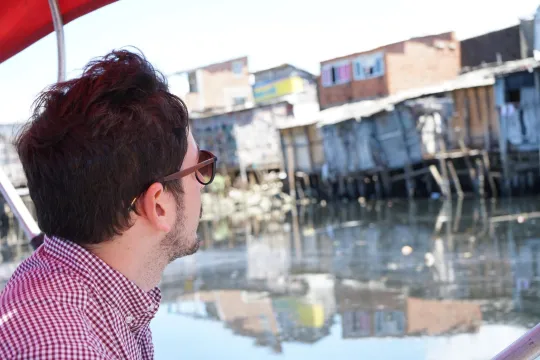
Community gathered for the workshop on green backyards. © Paulo Sergio / WRI Brasil
Residents of the Teresina Urban Lab begin to reap new fruits from their community engagement, implementing urban solutions that take climate change into account. In 2023, the second year of the Transformative Urban Coalitions project in the city, progress could be seen both on the streets and at residents’ homes and gardens.
Praça dos Sonhos, a traffic median turned into a public space through a community effort known as “mutirão”, quickly became the neighbourhood's meeting point, with a street fair organized by residents. Backyards have been turning greener through the planting of native and food seedlings, and solid waste is now separated for correct disposal. The Alliance also submitted an innovative project for a sustainable community centre to the municipal government.
Engaging communities to learn from transformative processes together is one of the objectives of the Transformative Urban Coalitions project. The initiative selected five cities and communities in Latin America to promote alliances between residents and different sectors of society, such as universities, public authorities, social organizations and private companies, to create innovative and sustainable solutions in a participatory and inclusive way. It thereby places those most affected by climate change at the centre of decision-making.
The Alliance for Residencial Edgar Gayoso mobilized several people and institutions to form a coalition with broad community participation, including university professors and students, environmental agencies, recycling and composting cooperatives, and public managers. Since the end of 2021, this group has been meeting to analyse the challenges faced by the community and discuss solutions for present and future needs. This process has unfolded in an environment conducive to dialogue and local coordination, with the residents’ involvement in actions leading to sustainable urban improvements.
Getting to know the community better
The Edgar Gayoso housing project was built under the social housing programme Minha Casa, Minha Vida, aimed at low-income families. In 2016, 459 single-story homes were delivered to beneficiary families. Seven years later, a community survey was carried out to assess how the community is doing. This increased community empowerment as it provided a more in-depth understanding of the people who live in the housing complex and their relationship with the territory.
Questionnaires were administered to 217 families at the Edgar Gayoso housing complex, representing 47 per cent of the houses built. 777 people live in these houses, the majority of whom moved to the residential complex to improve their living conditions. The survey also indicates that 87 per cent of residents declare themselves black or mixed race and that 28 per cent have a disability or chronic illness. Women are heads of households in 66 per cent of homes, which demonstrates their central role in family dynamics and is in line with the requirements of the Minha Casa, Minha Vida programme.
Families also belonged to the stakeholders who pointed out positive and negative aspects regarding the conditions of their homes. Positive aspects included good internal lighting (97 per cent of homes) and housing security (82 per cent). As for negative aspects, most respondents consider their home to be very hot (90 per cent).
The information collected provided an important starting point for the planning of actions to benefit the community, such as the Citizenship festival, which brought public servants to the neighbourhood to provide services such as ID issuance, assistance with resume writing, the distribution of Covid-19 vaccines, mental health services from the city’s Mental Health Network, conversation circles, a travelling beauty salon, etc.
Making the housing complex greener
In 2023, the stronger influence of the El Niño phenomenon added to the effects of climate change, which make extreme events more frequent and intense. It had an impact on several Brazilian regions, causing increased rainfall in the South, drought in the Amazon and periods of extreme heat in the southeast and northeast regions. In Teresina, the temperature reached 40°C, negatively affecting school activities. The capital of the state of Piauí is extremely hot and dry and is part of the Brazilian semi-arid region, an area undergoing desertification.
The Alliance’s survey diagnostics included the lack of trees and green spaces in the neighbourhood, with around 90 per cent of residents reporting heat as a negative aspect of their homes. Another characteristic of the neighbourhood is that most of the houses are surrounded by high walls that create a barrier to the street. At the same time, many of these internal courtyards do not have any trees or vegetation.
To increase greenery at the housing complex and promote food security, workshops on green backyards were held in 2023, preparing residents to grow fruit trees and food seedlings in their backyards. Residents received planting kits and a group was created to exchange experiences, with municipal officials and more experienced residents contributing to the group.
An initiative involving the afforestation of the neighbourhood was also planned during this process, with the aim of reducing the effects of extreme heat, currently worsened by the lack of green areas. The group is now waiting for the rainy season at the beginning of the year to plant the trees, with potential to transform the area in the long term.
Party held at Praça dos Sonhos to celebrate the Alliance’s achievements
The aim of TUC is to foster local community actions that can be multiplied into a global movement to improve lives and transform cities into green and liveable spaces, with more resilience and quality of life.
The most ambitious project of the Alliance for Residencial Edgar Gayoso is a community centre designed to promote income generation, education and professional training, as well as a space for social activities, sports and leisure, with the construction of a high-quality public facility that currently does not exist in that part of city. The project has been submitted to the municipal government of Teresina, which is working on the resources needed to carry out the work. In preparation of the construction of this centre, the Alliance has promoted bioconstruction workshops (rammed earth technique) and planned the establishment of a waste sorting and recycling area. These and other elements will make the community centre a reference in sustainability on the outskirts of Teresina.
In December, a special event was held to celebrate the year’s achievements. On this occasion, the Alliance for Residencial Edgar Gayoso invited the community to a party that not only marked the end of the year, but also allowed everyone to remember and celebrate the fruits of their hard and dedicated work together. Amid this atmosphere, memories were shared about the initiatives that contributed to improving people’s lives in the community.

